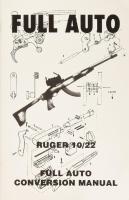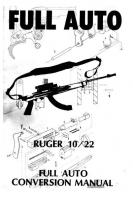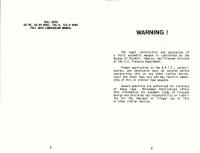Full Auto Ruger Mini-14 Conversion Manual 9997736826, 9789997736826
Full Auto Ruger Mini-14 Conversion Manual. Minuteman Publishing. 1982. Cleaned copy. Convert your Mini-14 to a tacti
137 67 4MB
English Pages 28 Year 1982
Recommend Papers

- Author / Uploaded
- Minuteman Publishing
- Similar Topics
- Technique
- Military equipment: Weapon
- Commentary
- Cleaned copy.
File loading please wait...
Citation preview
FULL AUTO
RUGER MINI-14
FULL AUTO > CONVERSION MANUAL
FULL AUTO
RUGER MINI-14 FULL AUTO CONVERSION MANUAL
Full Auto
Ruger Mini-14 Conversion Manual WARNING The a
fully
legal
construction
automatic
weapon
!
and is
possession
controlled
Bureau of Alcohol, Tobacco, and of the U.S. Treasury Department.
Firearms
by
of the
division
Proper application to the B.A.T.F., authorization, and permission must be secured before constructing this or any other similar device. Local
ship of this
and
state
of this
laws
vary
or similar
and
may
restrict
owner-
type weapons.
Severe penalties are authorized for violators these laws. Minuteman Publications offers information
for
academic
study
of
firearms
design and disclaims any responsibility or liabiiity for the improper or illegal use of this or other similar devices.
Table
Of
Contents
CONTENTS TRCHOGUCTION: SLUCHHINE
PAGE coc cence cccccecenccencccccvreses
INMOK:
7
ccccnvicceccveavecetveccceeses
9
Chapter 1 General Description And Mode Of Operation Soml AUtOMALIG Soc cee a cecicccncavecpesecuess
13
Chapter 2 General Description And Mode Of Operation Fall: Automatic ccc sss ieee ereeees
21
Chapter 3 Modifications
.......
29
.............
39
........seeeeeee
51
Chapter 4 New Parts Chapter 5 Material
To Be Made
To Weapon
To Be Manufactured For Construction
Introduction The purpose of this manual is to provide the necessary blueprints and manufacturing information for conversion of the semi-automatic civilian version, RUGER MINI-14 into a fully automatic weapon capable of firing multiple bursts, being fully controlled by the firer. The modification will be fully described later, but basically consists of alterations to the receiver, stock, and a sear group, and also the manufacturing of a disconnector assembly. The weapon can be converted to fire fully automatic or be restored back to semi-automatic in little more time than it takes to field strip it. This conversion does not provide selective
fire
capability.
due to its design
It
is very
reliable
and
rugged
and manufacture.
This manual presents the necessary data that would be required by a machinist or gunsmith to complete all modifications to the gun and to manufacture the required components. Engineers design weapons such as this with a great deal of care, and for successful operation care must also be exercised in the manufacturing procedures to be explained regarding this conversion.
Blueprint
Index
OPERATING SEQUENCE - SEMI AUTOMATIC A. Hammer sear. B. to
cocked,
Trigger strike
is the
cartridge.
engaged
depressed firing
trigger
releasing
pin
Secondary
with
and
sear
hammer
detonate
moves
the
forward
slightly.
C. The trigger is still depressed. The slide and bolt have cycled rearward causing the hammer to be forced rearward and engage the
D.
secondary
The
sear.
slide
stripping
a
and
bolt
cartridge
have
cycled
from
the
forward magazine.
The trigger is released and the secondary sear releases the hammer as the trigger sear engages and holds the hammer, ready for the next firing cycle. OPERATING
SEQUENCE
A. Hammer sear. The in position. B.
The
- FULL AUTOMATIC
cocked, engaged with trigger disconnector assembly is shown
trigger
is
depressed
releasing
the
hammer
to fire
the cartridge.
Disconnector
C. With the trigger still depressed, the slide and bolt have cycled rearward forcing the hammer to engage the secondary sear which had previously moved forward slightly as the slide unlocked the bolt and moved rearward. D. The slide and bolt move forward under recoil spring pressure. Just before the slide stops it makes contact with the tripping lever, forcing it forward. As the tripping lever pivots the disconnector forces the secondary sear rearward and releases the hammer to fire another cartridge. E. The trigger is released allowing the hammer to engage the trigger sear. The firer has only to depress the trigger to resume automatic fire. 3.
PARTS A.
TO MODIFY
Receiver
4.
Oo
Secondary
o
Slide
Stock
Sear
PARTS TO BE MANUFACTURED A.
Screw-Pivot,
Tripping
8.
Tripping
Lever
C.
Bushing,
Tripping
Lever
Lever
Pin-Disconnector Assembly
and
Pin-Disconnector, ment
Tripping
Secondary
Clip-Retaining-Disconnector Fixtrue-For machining.
holding
Lever Sear
Engage-
Pin
secondary
sear while
General
Of
Description
And
Operation—Semi
Mode
Automatic
SPECIFICATIONS The
RUGER
MINI-14
rifle
is
a
gas
operated,
semi-automatic firearm chambered for the .223 (5.56mm) caliber U.S. military and commercially manufactured cartridges. It is box magazine
fed
with
magazines
available
to
20, 30, and 40 rounds each. A drum magazine is also available. The MINI-14 takes properties from the U.S. of
weapons,
somewhat
M-14 externally. MINI-14 have had the
military
M-14
Hardened
hold
75
resembling
a
The internal several minor
scaled-down
parts of changes
springs.
The
MINI-14
its
introduction
agencies MINI-14
and for
One popularity
12
some
molybdenum
has in
become 1972.
steel
the is
its
very Many
governments
specialized
of
the from
rifle.
chrome
coil
10,
rotary
its basic mechanical military Garand family
is
in the breech and firing mechanisms. reliability is provided through the use wire
5,
round
and
reasonable
13
popular law
are
general
contributing
used
Spring of music since
enforcement
choosing
the
applications.
factors cost.
1982
to
its
prices
of
and
approximately
$350.00
for
ood investment. 540.00 required
$100.00
to
$285.00
the
for
stainless
Compared for a Colt
$150.00
for
the
the
gun
blue
version
make
it
a
to the approximate AR-15 and an extra
parts
to
convert
it to full auto, the RUGER is a practical choice for many people with inflation riddled budgets.
OPERATION The semi-automatic of the following steps: firer rifle.
mode
of operation
consists
secondary
hammer,
spring, firing
The the
inserts
a
loaded
magazine
into
2.
The slide is then pulled rearward until it stops, and then is released sharply thereby allowing the bolt, propelled forward under recoil spring tension, to strip a live round from the magazine and chamber it during forward movement. As the bolt face contacts the breech of the barrel, a camming surface in the slide rotates the bolt forcing two locking lugs into matching recesses in the receiver. This will prevent the bolt from moving rearward during the initial high pressure following detonation of the cartridge. At this point, the hammer is cocked and held back by an engagement between the sear notch on the trigger and the hammer.
(See drawing # 1A)
With the safety having been moved forward to "off", the firer then depresses the trigger which disengages the hammer from the trigger sear. In this same motion of the trigger,
4
is pin
sear
under
moves
forward
pressure
from
slightly.
the
hammer
propelled forward, striking the and detonating the cartridge.
(See drawing # 1B) The bolt will stay closed and locked until the chambered pressure drops to a safe level, and until a small amount of gas is vented from the barrel through the gas block blowing against the front of the slide with enough pressure to
unlock
action).
carrying
1.
3.
the
The
the
bolt
The
slide
with
it
(by
will
the
reversing
then
bolt
move
the
which
camming
rearward,
extracts
the spent cartridge and ejects it. The bottom of the bolt contacts and forces the hammer rearwards until it engages the secondary sear which will hold the hammer back. (See drawing # 1C) As the recoil spring compression overtakes the recoil] inertia, the slide will reverse and move forward, carrying the bolt which again strips a live cartridge from the magazine and forces it into the chamber. When the trigger is released, the sear engagement with the hammer will change. The trigger sear engages the hammer just before the secondary sear disengages from the hammer and moves rearward to its original position. By this time the bolt is locked into the receiver again and pressure applied to the trigger will again release the hammer to fire the cartridge and repeat the cycle.
*
NOTE-BOLT
&
SEAR
COCKED, SECONDARY
HAMMER
SECONDARY SEAR
HAMMER
WITH
TRIGGER SHOWN
ENGAGED. NOT
NOT SLIDE
IS
ENGAGED
SEAR.
TRIGGER SEAR (INTEGRAL WITH TRIGGER)
DRWG. OP.
NO. SEQ.
1-A SEMI-AUTO
NS ° TRIGGER STILL DEPRESSED: RECOILING BOLT ENGAGE SECONDARY SEAR. TRIGGER SEAR IS STILL FORWARD.
FORCED
HAMMER IS RELEASED AS IS DEPRESSED. TRIGGER TRIGGER SEAR AND SECONDARY SEAR ROTATE FORWARD SLIGHTLY.
OP.
DRWG.
HAMMER
OP.
DRWG.
: NO.
1-B
1-C
TO
AUTO
SEQUENCE-SEMI-AUTO
NO.
REARWARD
SEQ.-SEMI
Llo®
SEQ.-SEMI-AUTO OP.
BOLT & SLIDE (NOT SHOWN) HAVE CYCLED FORWARD. TRIGGER HAS BEEN RELEASED, SECONDARY SEAR & TRIGGER SEAR PIVOT WARD. HAMMER ENGAGES WITH TRIGGER SEAR AS SECONDARY SEAR DISENGAGES FROM HAMMER. DRWG. NO. 1-D i. 2.
ROTATION
REAR-
2
Automatic
Operation-Full
Of
Mode
And
Description
General
Before getting into the description of operation in the full-automatic mode, please refer to drawing # 2A which shows an overlay of disconnector assembly required for this conversion. This will help the reader better understand the sequence of operation.
sear to
When and
the trigger is depressed, the trigger hammer disengage, allowing the hammer
strike
the
firing
pin
and
detonate
the
car-
tridge. The slide unlocks the bolt and recoils backwards, extracting the spent cartridge. The firer still has the trigger depressed. The hammer is
caught
and
held
back
by
the
secondary
sear
as the bolt completes its rearward travel. (See drawing # 2C) Recoil spring pressure reverses the
bolt
travel
cartridge
from
it.
the
as is
As
which
the
cartridge
the bolt starts still not fully
that
it
contacts
it forward.
will
magazine
This
is
then
and
strip
begin
fully
a
tripping
live
chambered
to rotate to lock, closed. It is at lever
forward movement
a
to chamber and
the slide this time and
forces
of the tripping
lever produces a rearward movement of the disconnector which is attached to the secondary sear. This movement forces the secondary sear rearward,
releasing again.
the During
hammer the
time
to
strike necessary
21
the for
firing the
pin
secon-
resume automatic
firing.
Bx
ov
~~
oO
=z
ES
=
=
ae
'
2









![Full Auto Volume 1 - AR-15 Modification Manual [1]
9780879470616](https://ebin.pub/img/200x200/full-auto-volume-1-ar-15-modification-manual-1-9780879470616.jpg)